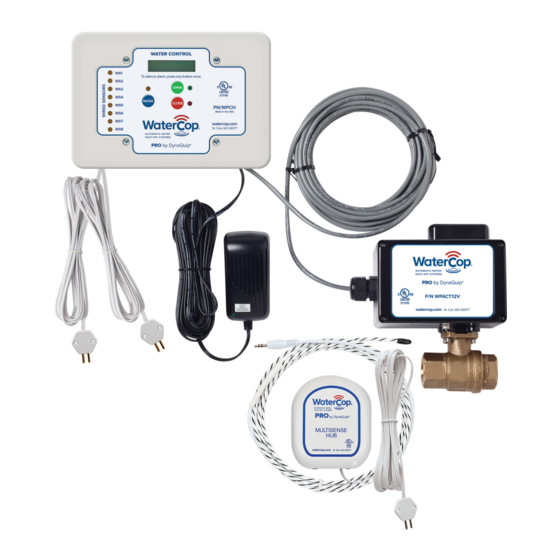DynaQuip WaterCop WPSC Benutzerhandbuch und Installationshandbuch - Seite 12
Blättern Sie online oder laden Sie pdf Benutzerhandbuch und Installationshandbuch für Kontrollsysteme DynaQuip WaterCop WPSC herunter. DynaQuip WaterCop WPSC 16 Seiten.

The transmitter in the wireless sensors and the receiver in the Water Control Panel communicate
by radio frequency . The smaller the distance between them, the stronger the signal will be .
Transmission distance is somewhat dependent upon the building layout and the type of
construction . The transmitter (the box attached to the sensor probe) must be kept dry . It is NOT
splash proof . Sensors should never be placed outdoors . The sensor probe detects the water
from a leak and is completely waterproof . Sensor probes should be placed on the surface or
in areas where water would tend to accumulate rapidly in common leak or overflow situations .
Make sure that any water from a leak will drain toward the sensor probe, not away from it.
Avoid high traffic areas where the cord or sensor probe could be stepped on or kicked and
where children or pets may disturb it . The sensor probe should be placed FLAT on the surface
so water can be detected as soon as it begins to accumulate. The sensor probe should be
secured to the surface with screws or adhesive . To avoid damage to transmitters and to provide
for the strongest signal possible, the transmitter portion of the leak sensor should be mounted
in a convenient location (on the wall, in a cabinet, closet, etc . ) 2 to 3 feet above the floor . (See
Installation section for details on sensor installation . )
WaterCop® Range Enhancing Repeater
Secure mounting tab
and screw
Why a Repeater?
If any of your WaterCop® wireless sensors are unable to communicate directly with your
WaterCop® Pro Control Panel during initial set-up and testing, adding a repeater (or more) to your
system may be the solution .
Basic Operation
Upon initial power-up, the red and green LEDs will flash and then go out . The LEDs light up when
the device is receiving and transmitting signals from WaterCop® wireless sensors .
Proper Location
Identify an unused 110VAC wall outlet/receptacle roughly midway between the WaterCop® Pro
Control Panel and the WaterCop® sensor that is farthest away and plug in the repeater . Test the
sensor(s) to ensure they now close the valve from the farthest location . Sometime more than one
repeater may be necessary due to great distances, obstructions, or type of construction .
Wireless Sensor Battery Life
High quality AAA alkaline batteries from brands like Energizer® and/or Duracell® are
recommended for powering your WaterCop® Classic sensors . It is recommended that you
replace the batteries in your WaterCop® sensors at least every 4 years . To ensure optimal
performance of your WaterCop® system, we recommend an immediate change of the batteries
in any sensor that has detected a water leak . Each wireless sensor will communicate a low
12
Red Transmit LED
Green Receive LED
